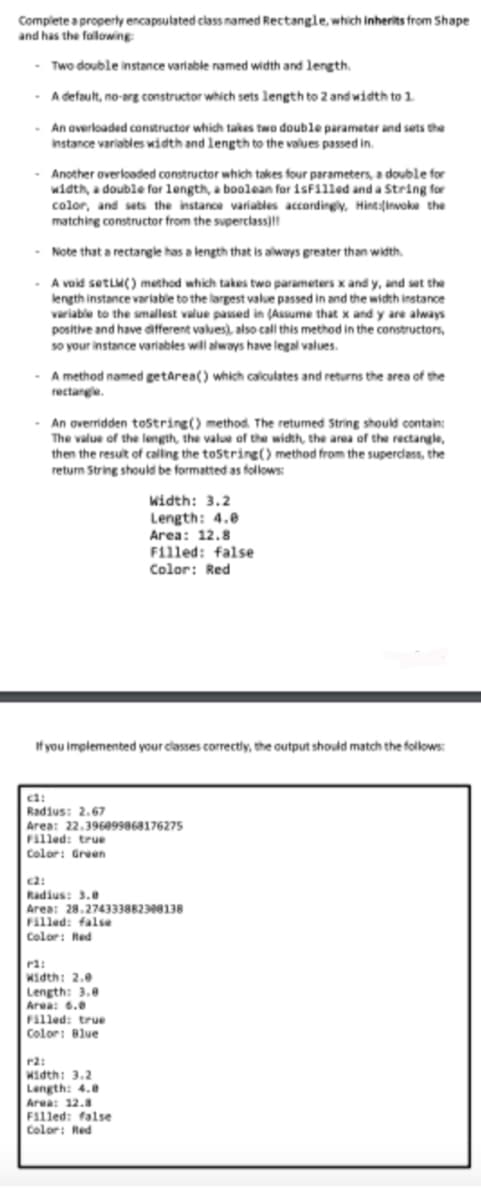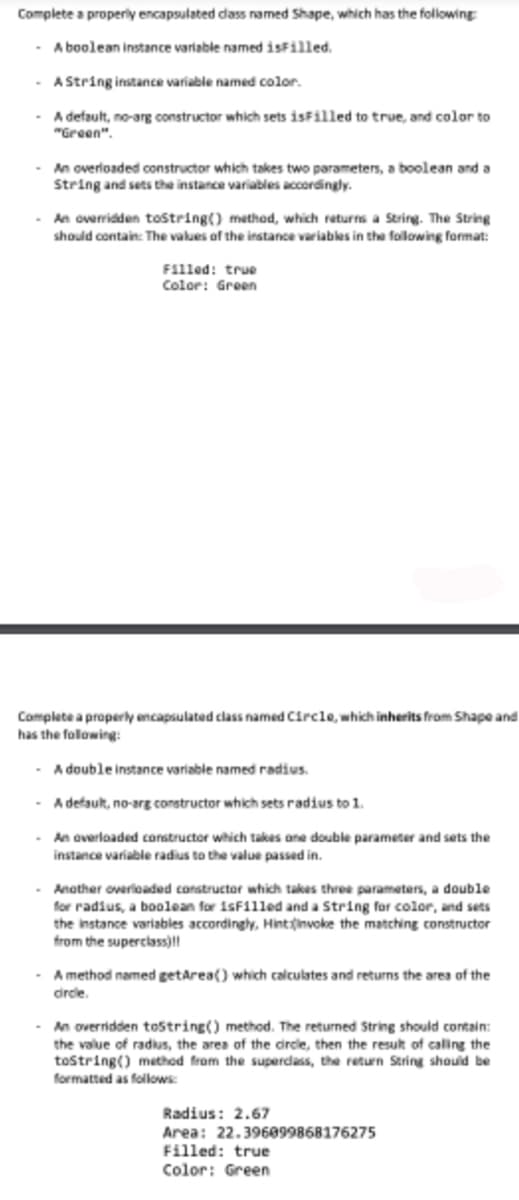public class TestShape { public static void main(String[] args) { /* Circle c1 = new Circle(2.67); System.out.println("c1: "); System.out.println(c1.toString()); System.out.println(); Circle c2 = new Circle(3, false, "Red"); System.out.println("c2: "); System.out.println(c2.toString()); System.out.println(); Rectangle r1 = new Rectangle(3, 2, true, "Blue"); System.out.println("r1: "); System.out.println(r1.toString()); System.out.println(); Rectangle r2 = new Rectangle(3.2, 4, false, "Red"); System.out.println("r2: "); System.out.println(r2.toString()); */ } }
public class TestShape { public static void main(String[] args) { /* Circle c1 = new Circle(2.67); System.out.println("c1: "); System.out.println(c1.toString()); System.out.println(); Circle c2 = new Circle(3, false, "Red"); System.out.println("c2: "); System.out.println(c2.toString()); System.out.println(); Rectangle r1 = new Rectangle(3, 2, true, "Blue"); System.out.println("r1: "); System.out.println(r1.toString()); System.out.println(); Rectangle r2 = new Rectangle(3.2, 4, false, "Red"); System.out.println("r2: "); System.out.println(r2.toString()); */ } }
Database System Concepts
7th Edition
ISBN:9780078022159
Author:Abraham Silberschatz Professor, Henry F. Korth, S. Sudarshan
Publisher:Abraham Silberschatz Professor, Henry F. Korth, S. Sudarshan
Chapter1: Introduction
Section: Chapter Questions
Problem 1PE
Related questions
Question
public class TestShape
{
public static void main(String[] args)
{
/*
Circle c1 = new Circle(2.67);
System.out.println("c1: ");
System.out.println(c1.toString());
System.out.println();
Circle c2 = new Circle(3, false, "Red");
System.out.println("c2: ");
System.out.println(c2.toString());
System.out.println();
Rectangle r1 = new Rectangle(3, 2, true, "Blue");
System.out.println("r1: ");
System.out.println(r1.toString());
System.out.println();
Rectangle r2 = new Rectangle(3.2, 4, false, "Red");
System.out.println("r2: ");
System.out.println(r2.toString());
*/
}
}

Transcribed Image Text:Complete a properly encapsulated class named Rectangle, which inherits from Shape
and has the following:
- Two double instance variable named width and length.
A default, no-arg constructor which sets length to 2 and width to 1.
- An overloaded constructor which takes two double parameter and sets the
instance variables width and length to the values passed in.
- Another overloaded constructor which takes four parameters, a double for
width, a double for length, a boolean for 1sFilled and a string for
color, and sets the instance variables accordingly, Hint:invoke the
matching constructor from the superclass)!!
- Note that a rectangle has a length that is always greater than width.
A void setLW() method which takes two parameters x and y, and set the
length instance variable to the largest value passed in and the width instance
variable to the smallest value passed in (Assume that x and y are always
positive and have different values), also call this method in the constructors,
so your instance variables will always have legal values.
A method named getArea() which calculates and returns the area of the
rectangle.
- An overridden toString() method. The returned String should contain:
The value of the length, the value of the width, the area of the rectangle,
then the result of calling the toString() method from the superclass, the
return String should be formatted as follows:
If you implemented your classes correctly, the output should match the follows:
ci:
Radius: 2.67
Area: 22.396099868176275
Filled: true
Color: Green
Width: 3.2
Length: 4.0
Area: 12.8
Filled: false
Color: Red
c2:
Radius: 3.0
Area: 28.274333882308138
Filled: false
Color: Red
P3:
Width: 2.0
Length: 3.0
Area: 6.0
Filled: true
Color: Blue
r2:
Width: 3.2
Length: 4.8
Area: 12.8
Filled: false
Color: Red

Transcribed Image Text:Complete a properly encapsulated class named Shape, which has the following:
- A boolean instance variable named isFilled.
A String instance variable named color.
A default, no-arg constructor which sets isFilled to true, and color to
"Green".
An overloaded constructor which takes two parameters, a boolean and a
String and sets the instance variables accordingly.
- An overridden toString() method, which returns a String. The String
should contain: The values of the instance variables in the following format:
Filled: true
Color: Green
Complete a properly encapsulated class named Circle, which inherits from Shape and
has the following:
- A double instance variable named radius.
A default, no-arg constructor which sets radius to 1.
- An overloaded constructor which takes one double parameter and sets the
instance variable radius to the value passed in.
Another overloaded constructor which takes three parameters, a double
for radius, a boolean for isFilled and a String for color, and sets
the instance variables accordingly, Hint:invoke the matching constructor
from the superclass)!!
A method named getArea() which calculates and returns the area of the
circle.
- An overridden toString() method. The returned String should contain:
the value of radius, the area of the circle, then the result of calling the
toString() method from the superclass, the return String should be
formatted as follows:
Radius: 2.67
Area: 22.396099868176275
Filled: true
Color: Green
Expert Solution
This question has been solved!
Explore an expertly crafted, step-by-step solution for a thorough understanding of key concepts.
This is a popular solution!
Trending now
This is a popular solution!
Step by step
Solved in 5 steps with 1 images

Knowledge Booster
Learn more about
Need a deep-dive on the concept behind this application? Look no further. Learn more about this topic, computer-science and related others by exploring similar questions and additional content below.Recommended textbooks for you

Database System Concepts
Computer Science
ISBN:
9780078022159
Author:
Abraham Silberschatz Professor, Henry F. Korth, S. Sudarshan
Publisher:
McGraw-Hill Education

Starting Out with Python (4th Edition)
Computer Science
ISBN:
9780134444321
Author:
Tony Gaddis
Publisher:
PEARSON

Digital Fundamentals (11th Edition)
Computer Science
ISBN:
9780132737968
Author:
Thomas L. Floyd
Publisher:
PEARSON

Database System Concepts
Computer Science
ISBN:
9780078022159
Author:
Abraham Silberschatz Professor, Henry F. Korth, S. Sudarshan
Publisher:
McGraw-Hill Education

Starting Out with Python (4th Edition)
Computer Science
ISBN:
9780134444321
Author:
Tony Gaddis
Publisher:
PEARSON

Digital Fundamentals (11th Edition)
Computer Science
ISBN:
9780132737968
Author:
Thomas L. Floyd
Publisher:
PEARSON

C How to Program (8th Edition)
Computer Science
ISBN:
9780133976892
Author:
Paul J. Deitel, Harvey Deitel
Publisher:
PEARSON

Database Systems: Design, Implementation, & Manag…
Computer Science
ISBN:
9781337627900
Author:
Carlos Coronel, Steven Morris
Publisher:
Cengage Learning

Programmable Logic Controllers
Computer Science
ISBN:
9780073373843
Author:
Frank D. Petruzella
Publisher:
McGraw-Hill Education